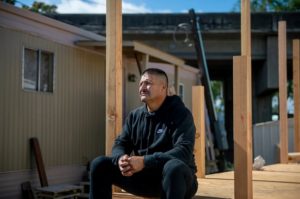
The New York Times featured the victims of devastating wildfires that destroyed homes, businesses, and communities in Southern Oregon in the fall of 2020.
Like entrepreneur Francisco Javier Torres, who saw wildfires last fall devour 14 mobile homes he had rescued from a scrap heap and restored as affordable rental housing for migrants hired for seasonal harvests of pears, grapes, and hemp.
Mr. Torres said. “My entire life’s work all gone, ash. My business was doing good. I always have more people calling me who want to rent a place than I have to offer. Now I’m just worried about what will happen with the 14 residents who stayed at Coleman Creek. I have nothing to offer them right now.”
In September 2020, Torres, who had moved to the Rogue Valley to plant trees and fight fires, saw his life’s work and his two-bedroom home literally go up in ashes when the Almeda Fire swept through Coleman Creek Estates in Phoenix, Ore., north of Ashland. He lost tools, a pickup, chainsaw, family photos, and keepsakes. The fire also destroyed homes and businesses in the nearby town of Talent just north of the California line.
Many Hispanic business owners and employees throughout Oregon and Northern California were left without any means of earning money during a year when they had already been devastated by the coronavirus pandemic and subsequent recession. Many didn’t qualify for federal or state assistance because they or their spouses were living in the country illegally.
In addition to businesses and homes, many Latinos, who account for 14 percent of the population in Jackson County, also lost their life savings kept at their houses because they lacked faith in the security of banks.
But in the wake of the wildfires, both immigrants and Oregon natives banded together to help their neighbors and rebuild. Food, clothing, and other donations flooded relief centers and restaurant owners worked together to feed the fire victims for months.
Read more